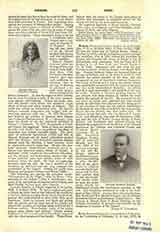

Drexel, FRANCIS ANTHONY, banker, b. at Philadelphia, U.S.A., June 20, 1824; d. there February 15, 1885. He was the oldest son of Francis Martin Drexel, a Tyrolese by birth, and by profession a portrait-painter and musician, who in 1837 turned his attention to finance, and founded the house of Drexel & Co. in Philadelphia with connections with the firms of J. S. Morgan & Co. of New York, and Drexel, Harjes & Co. of Paris. Associated with him were his sons Francis Anthony, Anthony Joseph, and Joseph William. Francis Anthony began his financial career at the age of thirteen, and at his father’s death in 1863 became the senior member of the firm, and was recognized as one of America‘s foremost financiers. The house of Drexel & Co. was in the public estimation unalterably associated with the strictest integrity and the most broadminded liberality. At critical periods it came generously to the support of the public credit. Francis A. Drexel’s growing fortune did not alienate him from religion or harden his heart against the appeals of charity. He remained to the end poor in spirit, and regarded his vast wealth merely as a Divinely lent instrument for doing good. In his exercises of piety and his copious distribution of charities, he was ably seconded by his second wife, Emma Bouvier Drexel, who died before him. His children by his first wife, who was Hannah J. Langstroth, were Elizabeth, who died September 26, 1890, and was the wife of Walter George Smith, of Philadelphia, and Katharine, who entered religion and founded the congregation of the Sisters of the Blessed Sacrament for Indians and Colored People (see CATHOLIC ENCYCLOPEDIA, II, p. 599). Another daughter, Louise, wife of Edward Morrell, was the only child of his second marriage. In his will Mr. Drexel followed the Biblical injunction of bequeathing a tithe ($1,500,000) of his great estate to religious and charitable purposes, with the further proviso that in case his daughters should leave no issue, the entire estate should be distributed among the institutions specified in the will. His daughters continued to walk in the foot-steps of their father. Among their own benefactions, Mrs. Smith and Mrs. Morrell founded the St. Francis Industrial School at Eddington, Pennsylvania. The Francis A. Drexel Chair of Moral Theology in the Catholic University of America was founded by his daughters in honor of Mr. Drexel.
JAMES F. LOUGHLIN

